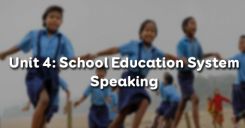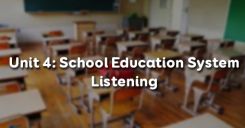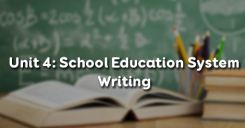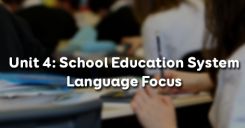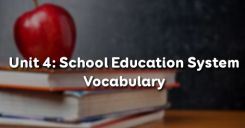Bài học Unit 4 Lớp 12 School Education System phần Reading cung cấp thông tin về hệ thống giáo dục ở Anh quốc. Thông qua bài học, các em được rèn luyện kỹ năng đoán nghĩa từ qua ngữ cảnh và kỹ năng đọc để nắm thông tin chi tiết của bài.
Tóm tắt bài
1.1. Before You Read Unit 4 Lớp 12
Read the facts below and decide whether the statements about schools in Vietnam are true (T) or false (F). Then compare your results with your partners'. (Đọc những thông tin dưới đây rồi xác định xem những câu sau về hệ thống giáo dục phổ thông ở Việt Nam là đúng (T) hay sai (F). Sau đó hãy so kết quả với các bạn khác.)
1. Children start Grade 1 when they are 6 years old.
2. Schooling is compulsory from the age of 6 to 16
3. The school year generally begins in September and ends in late May.
4. The students do not have any examinations when they finish secondary schoo
5. A school year consists of two terms.
Guide to answer
| 1 | 2 | 3 | 4 | 5 |
| T | F | T | F | T |
1.2. While You Read Unit 4 Lớp 12
Read the passage and do the tasks that follow. (Đọc bài khóa và làm những bài tập đi kèm.)
Bài đọc được chia làm 4 phần với những nội dung tương ứng như sau:
- Phần 1: Giới thiệu chung về hệ thống giáo dục ở Anh
- Phần 2: Phân loại hệ thống trường học
- Phần 3: Chương trình học bắt buộc tại các trường công lập
- Phần 4: Bảng tóm tắt thông tin chung về hệ thống giáo dục ở Anh
2.1. Unit 4 Lớp 12 Reading Task 1
Find words or phrases in the reading passage which have the following meanings. (Tìm từ hoặc cụm từ trong bài có nghĩa sau)
1. Schools in which all children can attend without paying tuition fees (Trường học mà mọi học sinh không phải đóng học phí)
2. A stage of study for children aged from 5 to 10 (Cấp học dành cho trẻ em từ 5 đến 10 tuổi
3. A stage of study for children aged from 11 to 16 (Cấp học dành cho trẻ em từ 11 đến 16 tuổi)
4. Put into force by the law (Theo luật định)
5. The examinations children sit at the end of compulsory education (Kì thi kết thúc giai đoạn giáo dục bắt buộc)
6. A detailed plan for a course of study offered in a school or college (Chương trình giảng dạy của trường phổ thông hoặc đại học)
Guide to answer
1. State schools (Trường công lập)
2. Primary education (Cấp độ tiểu học)
3. Secondary education (Cấp độ trung học)
4. Compulsory (Bắt buộc)
5. The General Certificate of Secondary Education (Kì thi tốt nghiệp trung học phổ thông)
6. Curriculum (Chương trình học)
2.2. Unit 4 Lớp 12 Reading Task 2
Answer the questions
1. When do children in England start their compulsory education at school? (Trẻ em ở Anh bắt đầu nghĩa vụ học tập của mình khi nào?)
2. How many terms are there in a school year in England? (Năm học ở Anh có bao nhiêu kỳ?)
3. What are the two school systems in England? (Hai hệ thống trường học ở Anh là gì?)
4. Do children have to pay fees if they go to "independent" or "public" schools? (Học sinh có phải đóng học phí ở trường tư thục không?)
5. How many core subjects are there in the national curriculum? (Có bao nhiêu môn học bắt buộc trong chương trình giáo dục quốc gia?)
6. When can students take the GCSE examination? (Khi nào thì học sinh tham dự kì thi GCSE?)
Guide to answer
1. They reach the age of 5.
2. There are three terms.
3. The two school systems in England are the state school system and the "independent" or “ public” school system.
4. Yes, they do.
5. There are three core subjects in the national curriculum: English, Maths and Science.
6. When they finish the secondary schools, they have to take an examination called the General Certificate of Secondary Education. (GCSE)
1.3. After You Read Unit 4 Lớp 12
Work in groups. Tell the others one of the most difficult school subjects are you studying and what you would like your friends and your teacher to do to help you learn that subject more effectively. (Làm việc theo nhóm. Hãy nói về một trong những môn học em cảm thấy khó nhất và muốn bạn bè và giáo viên giúp gì cho em học môn đó hiệu quả hơn.)
Guide to answer
Dialogue 1
A. Is there any subject you find the most difficult?
B. Yes, it's English.
C. What do you find difficult about it?
B. Its pronunciation. Most of my friends do think so.
C. Do you ask your teacher to help you?
B. Why not? But after a lot of practices I still find I cannot pronounce and read the words correctly.
A. Well, from my experience, in order to speak English well and correctly we should be patient and constant. It takes a lot of time and patience. You read a word or a sentence many times until you find it good enough.
C. And you should study with your friends to help one another in speaking. If possible, you can ask your teacher to correct you when you find you‘re run good or not confident in yourself.
A. You will speak more easily and better if you're patient and practise frequently.
Dialogue 2
A. What subjects do you think it is the most difficult?
B. For me, it is History.
C. Oh, what difficulties do you find about it?
B. Yeah, it's too long to remember all the historical events.
A. Do you want to ask your teacher help you?
B. Of course, I would learn it better if the teacher could help with a short description of each event.
C. Well, I think the teacher is willing to help you.
1.4. Phần dịch bài Reading Unit 4 Lớp 12
Ở Anh mọi trẻ em từ 5 đến 16 tuổi đều phải đến trường. Năm học ở Anh kéo dài từ tháng Chín đến tháng Bảy và được chia thành ba học kì. Học kì mùa Thu từ đầu tháng Chín đến giữa tháng Mười hai. Học kì mùa Xuân từ đầu tháng Giêng đến giữa tháng Ba còn học kì mùa Hạ từ đầu tháng Tư đến giữa tháng Bảy. Giữa các học kì có một kì nghỉ dài một tuần gọi là kỳ nghỉ giữa học kì, thường thường vào cuối tháng Mười, giữa tháng Hai và cuối tháng Năm.
Ở Anh có hai hệ thống giáo dục song song nhau. Hệ thống thứ nhất là hệ thống trường công (nhà nước), nơi mà mọi học sinh không phải đóng học phí và được nhà nước cấp kinh phí. Hệ thống thứ hai là hệ thống nhà trường “tư thục” hay “công cộng”, phải đóng học phí. Hệ thống trường công, nơi đào tạo 93% học sinh nước Anh, có thể được chia làm hai cấp độ giáo dục: giáo dục tiểu học và giáo dục trung học.
Xem bảng bên dưới để biết thêm thông tin về hệ thống giáo dục ở Anh.
Chương trình học quốc gia do chính phủ thiết lập và tất cả các trường công lập đều phải tuân thủ theo quy định này. Chương trình gồm những môn học sau : tiếng Anh, Thiết kế & Kĩ thuật, Địa lí, Toán, Công nghệ thông tin, Nhạc, Khoa học, Hội họa, Thể dục, Lịch sử và một ngoại ngữ hiện đại. Tiếng Anh, Toán và Khoa học là những môn học chính, những môn bắt buộc ở các kì thi quốc gia ở giai đoạn đặc biệt của hệ thống giáo dục nhà trường.
Hệ thống giáo dục ở Anh
| Cấp học | Lớp (từ-đến) | Tuổi (từ-đến) | |
|
Mẫu giáo |
nhà trẻ |
3 - 4 |
|
|
mẫu giáo hoặc tiểu học |
4 - 5 |
|
|
|
Giáo dục tiểu học |
1 - 3 |
5 - 7 |
|
|
4 - 6 |
8 - 10 |
|
|
|
Giáo dục trung học |
7 - 9 | 11 - 14 | |
| 10 - 11 |
14 - 16 (kết thúc giáo dục bắt buộc) |
GCSE |
Bài tập minh họa
Read the passage and do the exercises below
In Britain, children are required to be in full time education between the ages of 5 and 16. Different areas of Britain have different school systems. In some area, children receive their primary education at an infant school and them a junior school, or at a primary school that combines the two. At about 11 they begin their secondary education at a comprehensive school, a grammar school or a high school. In other areas children go to a first school at age 5, a middle school at 8 and an upper school from 13 onwards.
Most children go to state schools. Until 1988 these were all responsible to a Local Education Authority (LEA). LEA obtain their funding from central government and the council tax. In 1988 secondary schools and larger primary schools were encouraged to opt out of LEA control and become grant-maintained.
Some children go to independent schools run by private organizations, for which their parents have to pay fees. A few go to public schools, such Eton and Harrow. Younger children may attend a private preparatory school (or pre-school) until the age of 13. Some parents may send their children to private schools, even if this is against their principles, because they think that their children will receive a better education.
The British education system aims to educate the whole person, so that each child develops his or her personality as well as gaining academic knowledge. Most primary and secondary schools offer a range of extra-curricular activities , including sports, music, community service and trips to places of interest. Secondary schools also give careers advice and help students to prepare for having a job by arranging short periods of work experience with local businesses.
Unit 4 Exercise 1
True or False?
1. There are two parallel school system in Britain.
2. Some English children receive their primary education at the age of 8.
3. Since 1988, most state schools have received money direct from central government.
4. Independent schools receive no money from the government.
5. Many activities outside normal lessons are offered at school in Britain.
Key
| 1 | 2 | 3 | 4 | 5 |
| T | F | T | T | T |
Unit 4 Exercise 2
Answer the questions
1. What is the difference between a state school and an independent school in Britain?
2. What is the purpose of the British education system?
Key
1. In Britain, the state school receives money direct from central government and children in this school don't have to pay fees. Meanwhiles, children go to independent school run by private organizations have to pay fees.
2. The British education system aims to educate the whole person, so that each child develops his or her personality as well as gaining academic knowledge.
Bài tập trắc nghiệm Reading Unit 4 Lớp 12
Như vậy là các em đã xem qua bài giảng phần Reading Unit 4 School Education System chương trình Tiếng Anh lớp 12 về hệ thống giáo dục. Nhằm giúp các em phát triển kỹ năng đọc hiểu về đề tài hệ thống giáo dục, mời các em tham gia thực hành Trắc nghiệm Unit 4 lớp 12 Reading.
-
Câu 1: Choose the item (A, B, C or D) that best completes each of the following sentences.
In 1988, for the first time in British history, a National Curriculum was introduced. The National Curriculum tells pupils which subjects they have to study, what they must learn and when they have to take assessment tests. [assessment: đánh giá]
Between the ages of 14 and 16, pupils study for their GCSE (General Certificate of Secondary Education) exams. Pupils must take English Language, Maths and Science for GCSE, as well as a half GCSE in a foreign language and Technology. In addition, they must also be taught Physical Education, Religious Education and Sex Education, although they do not take exams in these subjects.
At the age of 16, pupils can leave school. If pupils stay on, they usually take A (Advanced) levels, AS (Advanced Supplementary) level or GNVQs (Greater National Vocational Qualifications). It is quite common to combine, for example, two A levels with one AS level, or one A level with one GNVQ.
Pupils taking A levels study traditional subjects, such as French, Physics or History. To go to university, pupils usually need two or three A levels.
AS levels are the same standard as A levels, but only half of the content: AS level German pupils take the A-level German language exam, but do not take the A-level German Literature exam.
GNVQs are vocational qualifications. Pupils usually take on GNVQ in subjects such as Business, Leisure and Tourism, Manufacturing, and Art and Design. One GVNQ (at advanced level) is equal to two A levels.
Britain began to have a National Curriculum _________.
- A. one hundred years ago
- B. in the nineteenth century
- C. in 1898
- D. in 1988
-
- A. Science
- B. Physical Education
- C. Maths
- D. English
-
- A. one or two
- B. two or three
- C. four or five
- D. five or six
Câu 4-10: Mời các em đăng nhập xem tiếp nội dung và thi thử Online để củng cố kiến thức về bài học này nhé!
Hỏi đáp Reading Unit 4 Lớp 12
Trong quá trình học tập nếu có thắc mắc hay cần trợ giúp gì thì các em hãy comment ở mục Hỏi đáp, Cộng đồng Tiếng Anh HOC247 sẽ hỗ trợ cho các em một cách nhanh chóng! Sau bài học Reading này các em chuyển qua bài học mới Unit 4 Lớp 12 Speaking kế tiếp. Chúc các em học tốt!
-- Mod Tiếng Anh 12 HỌC247






